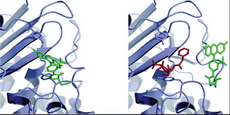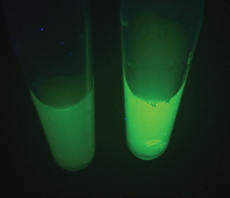|
|
|
|
|
|
|
Fluorescent biosensor to detect antibiotic residue |
||
|
Fluorescent biosensor to detect antibiotic residue |
There is public concern about the health risks arising from antibiotic resistance caused by antibiotic residue in food. In view of this, Prof. Wong Kwok-yin, Dean of Faculty of Applied Science and Textiles, Prof. Thomas Leung Yun-chung, Department of Applied Biology and Chemical Technology, and Dr Chan Pak-ho, Associate Director of the Food Safety and Technology Research Centre, have jointly developed an easy-to-operate biosensor for detecting beta-lactam antibiotics and beta-lactamase inhibitors. Adopting probing technology, this biosensor is made based on enzymes (beta-lactamases) from pathogenic bacteria. The researchers attached an environment-sensitive fluorescent molecule to the enzyme. When beta-lactam antibiotics and beta-lactamase inhibitors exist in food samples under testing, the probe will fluoresce. This technology also allows the fine-tuning of fluorescence colours for different purposes. This innovation recently won a second-class award in the Natural Science category of the Ministry of Education’s Higher Education Outstanding Scientific Research Output Awards (Science and Technology) 2013.
|

